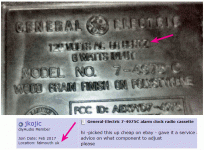hi -picked this up cheap on ebay - gave it a service and all went well until testing reveals the clock part running slow-any advice on what component to adjust
please
Vintage General Electric Alarm Clock Radio with Cassette Player Model 7-4975C | eBay
please
Vintage General Electric Alarm Clock Radio with Cassette Player Model 7-4975C | eBay
Is your profile location accurate: UK ?
This is a 120V 60Hz product. The UK is mostly 230V and 50Hz.
I'm surprised it doesn't blow-up on the high voltage.
These clocks typically counted line-frequency cycles to keep time. 50Hz on a 60Hz product will tend to run at 5/6 speed, count 20 hours every day. If that is what yours is doing, it's working as expected.
The fix would be an internal mod in the counter. If ever intended for dual-Hz products, there will be a /5 or /6 counter stage. If it is a lot of TTL/CMOS gate chips, you maybe could even figure it out. If an all-in-one chip, find the docs, there may be a jumper. Or they may have made the "same" chip in -5 and -6 variants, since there is little reason to change Hz after the sale.
The extreme solution would be a 60Hz sine source through a 10W-20W power amp stepped-up to 120V AC 60Hz. I have done that to salvage a phono player. Not an easy thing to rig well.
Apologies if you knew all that.
This is a 120V 60Hz product. The UK is mostly 230V and 50Hz.
I'm surprised it doesn't blow-up on the high voltage.
These clocks typically counted line-frequency cycles to keep time. 50Hz on a 60Hz product will tend to run at 5/6 speed, count 20 hours every day. If that is what yours is doing, it's working as expected.
The fix would be an internal mod in the counter. If ever intended for dual-Hz products, there will be a /5 or /6 counter stage. If it is a lot of TTL/CMOS gate chips, you maybe could even figure it out. If an all-in-one chip, find the docs, there may be a jumper. Or they may have made the "same" chip in -5 and -6 variants, since there is little reason to change Hz after the sale.
The extreme solution would be a 60Hz sine source through a 10W-20W power amp stepped-up to 120V AC 60Hz. I have done that to salvage a phono player. Not an easy thing to rig well.
Apologies if you knew all that.
Attachments
Pretty sure you got that right.. Hopefully the cassette deck has a DC motor other otherwise it will also run slow. (I had a Hitachi cassette deck with hysteresis synchronous motor, fortunately it had a pulley grooved for both 50 and 60Hz.)
- Status
- Not open for further replies.
